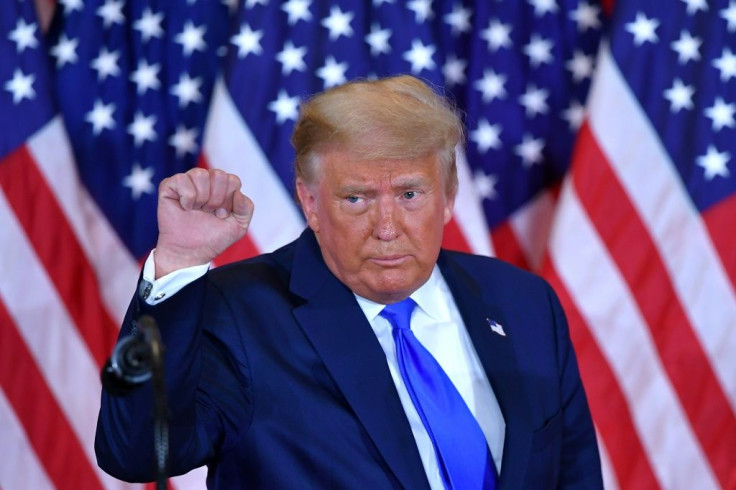Fact Check: Trump's Premature Declaration Of Victory
In an address early Wednesday from the White House, after polls had closed but while ballots were still being counted in battleground states, US President Donald Trump falsely declared that he had won reelection.
His remarks came hours after a tweet in which he said: "We are up BIG, but they are trying to STEAL the Election. We will never let them do it. Votes cannot be cast after the Polls are closed!"
Trump had a significant lead in Pennsylvania and slimmer edges in Michigan and Wisconsin at the time, according to US television networks.
But Twitter flagged the tweet, saying its content was disputed given the incomplete results. Trump's opponent Joe Biden had earlier said he was confident of overturning the president's advantage in the Midwest states.
AFP fact-checks key quotes from Trump's remarks:
"I want to thank the American people for their tremendous support, millions and millions of people voted for us tonight. And a very sad group of people is trying to disenfranchise that group of people and we won't stand for it."
State officials are tallying votes that were legitimately cast for both candidates before polls closed. Millions of ballots were sent by mail or deposited at official drop boxes. Trump offered no evidence -- indeed, there is none -- that people who voted for the president are being disenfranchised.
"We have won Georgia. We're up by 2.5 percent or 117,000 votes with only seven percent left. They're never going to catch us. They can't catch us."
The count in Georgia is incomplete, with tallies in several Democrat-leaning urban centers around the state capital Atlanta yet to come. At 2300 GMT, no television network had called Georgia for either Trump or Biden, and the gap had narrowed to 1.4 percent, with 6 percent of the count remaining.

"We're up 690,000 votes in Pennsylvania. These aren't even close... with 64 percent of the vote in, it's going to be almost impossible to catch."
Trump is leading strongly in Pennsylvania and Biden faces a hard climb to erase the president's advantage. However, most of the uncounted ballots are in traditionally Democratic-heavy areas.
"This is a fraud on the American public. This is an embarrassment to our country. We were getting ready to win this election. Frankly, we did win this election."
No television network or the Associated Press, the main US news agency that compiles vote returns, has declared an overall winner. Therefore, Trump's declaration of victory was premature.
Trump, without evidence, has for months criticized mail-in ballots, saying it will lead to fraud and a rigged election. But Americans relied on postal voting -- which is expected to favor Biden -- in unprecedented numbers because of the coronavirus pandemic.
Trump's early leads in Wisconsin and Michigan were built up by high in-person voting on November 3. But that advantage evaporated on Wednesday when mail-in votes were tallied. US networks later called both races for Biden.
After his speech, Trump had reiterated his claims on Twitter, writing: "Last night I was leading, often solidly, in many key States, in almost all instances Democrat run & controlled. Then, one by one, they started to magically disappear as surprise ballot dumps were counted. VERY STRANGE, and the 'pollsters' got it completely & historically wrong!"
"We'll be going to the US Supreme Court. We want all voting to stop. We don't want them to find any ballots at four o'clock in the morning and add them to the list. We will win this and as far as I am concerned we already have won it," Trump said in the White House speech.
After Biden overtook Trump in Wisconsin on Wednesday, the president's team announced plans to seek a recount, and said it was suing to halt the vote counts in Michigan and Pennsylvania. Any legal challenge will have to be pursued in individual states or at a federal level before it can reach the country's highest court.
© Copyright AFP {{Year}}. All rights reserved.




















